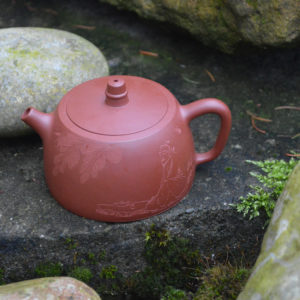Description
Chi Cha Qu 喫茶去 Let’s drink tea!
Suici Dingyou 歲次丁酉 Year of Dingyou
Qiu Yue 秋月 Autumn month
Gu Yangxian 古陽羡 Ancient name of Yixing
Yunshi 雲石 Cloud and stone
Origin: Dingshu, Yixing Town
Material: red purple-clay (Hongni Zisha 红泥 – Raw ores)
Material: red purple-clay (Hongni Zisha 红泥 – Raw ores)
Color: brown red
Size: 12.5cm*6.5cm*9cm (220ml)
Shape: Jinglan 井栏 (Brandreth)
Firing temperature: up to 1100℃
Shape: Jinglan 井栏 (Brandreth)
Firing temperature: up to 1100℃
Contraction ratio: 14%
Time: autumn-winter 2017 (Dingyou year丁酉年, 34th year of the Sexagenary Cycle)
Design: Wenzhuo Liu 劉文卓
Artisan: Aizhen Ding 丁爱珍
Engraver: Yijun Xie 謝一軍
Artisan: Aizhen Ding 丁爱珍
Engraver: Yijun Xie 謝一軍
Direction:
Purple-clay teapots retain flavor well; one should dedicate each teapot to a specific type of tea (black, oolong or dark tea) so that the flavor doesn’t become corrupted. Never wash clay pots with Soap.
Introduction:
Engraving means carving words or pictures on wood or stone with a knife, as is the case with the engraved Zisha pottery, that is, carving words and pictures on the walls of Zisha pottery. Engraving is a very common decoration technique and the main form of the decoration of Zisha teapots, by leaving poems and songs, flowers, birds, insects and fish, and landscape and figures on teapots, the art of literature, calligraphy, painting and seal cutting has been added to the teapots.
Purple-clay 紫砂 [zǐ shā] is famous of high in iron and silicon contents, featuring high plasticity, the glossier surface the more useages of brewing tea. Tea sets made from purple-clay is not normally glazed. A finished product is primarily purple, thus it is named. This pottery can be divided into different colors, such as purple-brown “purple clay” which is in amaranth or light purple; gray-yellow “green clay” in gray or gray-blue; vermeil “red clay” in red-brown. Purple-clay tea set has a long history in China. Su Shi, the great scholar of the Song Dynasty, had designed a pot with handle, called “Dongpo Pot with Loop Handle”. In the Ming Dynasty, making loose tea in a small pot was popular, which led to the development of purple-clay pots.













































